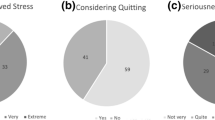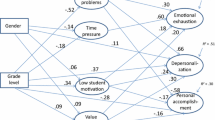Abstract
The present study attempts to document the difficulties that teachers in Macau encountered in their work, the extent to which the job-related difficulties would induce burnout, and whether or not social support could buffer the adverse effects of stress on burnout. In-service teachers enrolled in a teacher training program filled out questionnaires addressing the variables of interest. The results indicated that difficulties with fellow teachers, supervisors, students, and parents of students were associated with burnout. Conjectures were made regarding the noneffectiveness of social support.
Similar content being viewed by others
References
Cohen, S., & Syme, S. L. (Eds.). (1985).Social support and health. New York: Academic Press.
Cohen, S., & Wills, T. A. (1985). Stress, social support, and the buffering hypothesis.Psychological Bulletin, 98, 310–335.
Dunkel-Schetter, C. (1984). Social support and cancer: Findings based on patient interview and their implications.Journal of Social Issues, 40(4), 77–98.
Fisher, J. D., & Nadler, A. (1982). Determinants of recipient reactions to aid: Donor-recipient similarity and perceived dimension of problems. In T. A. Willis (Ed.),Basic processes in helping relationships. (pp. 131–152). New York: Academic Press.
Kyriacou, C. & Sutcliff, J. (1978). Teacher stress: Prevalence, sources, and symptoms.British Journal of Educational Psychology, 48, 159–167.
Maslach, C., & Jackson, S. E. (1982). Burnout in health professionals: A social psychological analysis. In G. S. Sanders & J. Sul (Eds.),Social psychology of health and illness (pp. 227–250). Hillsdale, NJ: Lawrence Erlbaum.
Mickler, S., & Rosen, S. Burnout: The fate of spurned professional care-givers? Unpublished manuscript, University of Georgia.
Schonfeld, I. S., & Ruan, D. (1991). Occupational stress and preemployment measure of depressive symptoms: The case of teachers.Journal of Social Behavior and Personality, 6, 95–114.
Shinn, M., Lehman, S., & Wong, N. W. (1984). Social interactions and social support.Journal of Social Issues, 40(4), 55–76.
Shumaker, S. A., & Brownell, A. (1984). Toward a theory of social support: Closing conceptual gaps.Journal of Social Issues, 40(4), 11–36.
Wilson, C. F. (1980). Wilson stress profile for teachers. Unpublished manuscript. (Available from C. F. Wilson, Department of Education, San Diego County, 6401 Linda Vista Road, San Diego, CA 92111).
Wortman, C. B. & Dunkel-Schetter, C. (1979). Interpersonal relationships and cancer: A theoretical analysis.Journal of Social Issues, 35, 120–155.
Author information
Authors and Affiliations
Rights and permissions
About this article
Cite this article
Cheuk, W.H., Wong, K.S. Stress, social support, and teacher burnout in Macau. Current Psychology 14, 42–46 (1995). https://doi.org/10.1007/BF02686872
Accepted:
Issue Date:
DOI: https://doi.org/10.1007/BF02686872




